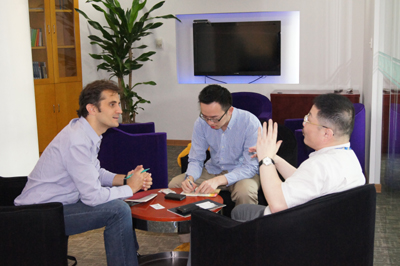如今,越来越多的国外媒体企业和人士开始关注中国企业,中国企业的发展是举世瞩目的,每个企业成长的道路又不是完全相同的,而对于以孔子为代表的传统文化,是否在现今社会仍然能有所影响中国企业的发展,对中国企业或掌舵人有所启示和借鉴?作为全球最大的财经资讯公司,彭博新闻社Bloomberg Businessweek 非常关注中国的金融行业的企业家如何理解孔子和中国传统文化。
2012年10月17日,Duran德润副总经理秦裕农先生受邀接受彭博新闻社记者Dexter Roberts关于《谈孔子在中国的回归》采访。秦裕农先生作为上海闸北小额贷款股份有限公司副总经理和董事,同时也是中欧国际工商学院校友会国学会会长,与其分享了自己10多年来对孔子和中国传统文化的理解和体会,并从贷款行业的角度出发,介绍了传统文化是如何介入、影响到德润的发展和工作中的及其所带来的好处。
★美国彭博新闻社Bloomberg Businessweek 成立于1981年,是全球最大的财经资讯公司,其前身是美国创新市场系统公司,现在,该公司已经发展成为了集新闻、数据和数据分析为一体的全球性多媒体集团。彭博仅用了22年的时间,就将它的金融数据市场的销售收入超越了具有150年历史的、世界上最大的资讯公司——路透集团。

报道原文:
On Oct. 27 dozens of scholars packed a conference room in Beijing’s university district for a weekend forum on Confucianism. There was much discussion of traditional topics, like the leadership role in society for junzi—or the exemplary gentleman—and the proper place for xiaoren—the short-sighted, acquisitive average citizen. These were first raised by the Chinese sage some 2,500 years ago and compiled by his disciples in the Analects.
Confucius is inspiring books and movies in present-day China
The scholars’ often-heated debates also raised more contemporary questions: How can traditional ideals of benevolence help a rising China build its soft power? Can an emphasis on harmony quell a spiritual crisis triggered by excessive materialism? And could a government based on meritocratic Confucian principles eventually replace China’s brittle Party-dominated authoritarianism?
Confucius, the sixth-century B.C. Chinese philosopher and teacher, developed a school of thought emphasizing ritual, harmony, and the proper order of social relationships, especially within the family. He stressed obedience to authority and believed a society’s leaders should not be selected based on hereditary titles but on achievement. In China today a strong allegiance to family, ancestor worship, and education reflects Confucianism’s continuing influence—even though Mao Zedong and other revolutionary leaders savaged Confucianism as the philosophy of the imperial era and the mandarins who subjugated the peasants to quasi-slavery. In 1973, toward the end of the Cultural Revolution, Mao’s wife launched the “Criticize Lin, Criticize Confucius” campaign, which equated the ancient philosopher with Lin Biao, a reputedly reactionary, coup-plotting general. Confucian temples were destroyed and sacred texts of his teachings were burned.
Photograph by Keystone/Getty ImagesMao’s wife started a vicious anti-Confucius campaign in 1973
Today, some 30 years after China threw open its economy, political scientists are publishing such books as Ancient Chinese Thought, Modern Chinese Power by Yan Xuetong, who advocates a state based on the Confucian concept of “humane authority.” Writes Yan: “The goal of our strategy must be not only to reduce the power gap with the United States but also to provide a better model for society than that given by the United States.” Yan gave the opening address at the forum. Another speaker, Jiang Qing, founder of the Yangming Confucian Academy in Guiyang, advocated replacing Communism with a Confucian-based system, complete with an appointed legislature and a symbolic monarch, as superior to adopting Western liberal democracy.
The beginning of the Confucius revival dates back several years. The biopic Confucius was released in theaters across China in early 2010, and there’s been a push to get children to read traditional Chinese philosophy. What’s newer is the growing effort to use Confucian principles in politics and economics.
Economists are citing Confucius’ support for a small state as evidence of the value of a more privatized economy. Sheng Hong, director of the Unirule Institute of Economics in Beijing, co-authored a report critical of resurgent state capitalism in China, citing the sage’s advocacy of small government and limited taxation. “Confucius’ theory is very similar to the invisible hand of Adam Smith,” says Sheng. “People will [naturally] seek their own benefit, the government doesn’t have to interfere, and the economy will flourish.”
Even entrepreneurs are meeting to discuss what business strategies might be gleaned from traditional philosophy. “People read Confucius to help them do business better,” says Qin Yunong, who runs a Shanghai-based micro-credit company. His lending decisions are partly based on how deferential to parental authority applicants are, because that trait correlates with reliability in repaying loans, Qin says. He also heads a Chinese traditional philosophy study group, with 400 businesspeople as members.
As corruption taints the legitimacy of today’s one-party system, scholars like Fudan University’s Bai Tongdong are arguing for a new model that incorporates more accountability, as in Western democracies, but avoids what he sees as the West’s serious flaws. “No one believes in Communism anymore. But one man, one vote doesn’t work either,” says Bai, citing problems such as massive budget deficits and an inability to slow global warming as examples of problems democracies aren’t well equipped to tackle. “The modern state is too big and too complicated for average people to understand. And people don’t have the time anyway.” He advocates a bicameral system, with one house popularly elected and a second house chosen by a vote of wise and capable elites, much as Confucius would advocate today, he says. Only those who passed a test or proved themselves through a track record of previous political service would have the right to vote for the second house.
The government has provided qualified support for the Confucius revival. The biopic, for example, was heavily promoted by the state. (It was a box-office flop.) Government-coined slogans, such as “harmonious development”—aimed at promoting more balanced growth—sound more Confucian than Marxist, points out Jean-Pierre Cabestan, the head of the Department of Government and International Studies at Hong Kong Baptist University. “The Party uses Confucianism as a tool, as a way to legitimize their rule, and as a way of criticizing Western democracy,” says Cabestan. He says he doesn’t think the Party is ready to embrace the scholar’s precepts seriously. Confucius’ modern-day disciples face a long struggle to make the sage the true center of the Chinese political system once more.